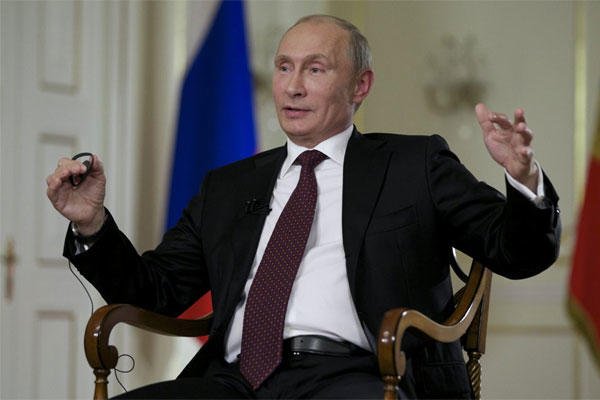Russian President Vladimir Putin has warned the U.S. against using military force in Syria, saying it "would increase violence and unleash a new wave of terrorism."
The admonition, published Thursday in an op-ed in The New York Times, came the same day Russia leaked plans of a possible diplomatic solution to the Syrian conflict that would force the regime of Bashar al-Assad to turn over its chemical weapons to international control for destruction.
Putin's push to help broker a potential alternative to a U.S.-led military strike while criticizing Washington for "commonplace" military interventionism has vaulted him past President Barack Obama in the international spotlight and driving the agenda on Syria.
"Putin probably had his best day as president in years yesterday," Ian Bremmer, the president of Eurasia Group, a political risk consultancy based in New York, told The New York Times, "and I suspect he's enjoying himself right now."
In a primetime televised address Tuesday, Obama made a case for a military strike on Syria, even while he requested that Congress delay a vote to authorize such a move to pursue a diplomatic solution. The announcement signaled a shift in the White House's approach. Administration officials had pressed lawmakers to quickly authorize a limited air strike against Syria in response to an alleged chemical weapons attack on civilians. The Senate had scheduled to vote on the issue this week.
The Syrian regime allegedly killed at least 1,429 people, including at least 426 children, in an Aug. 21 gas attack in the suburbs of Damascus, according to an unclassified U.S. intelligence assessment of the incident.
In the op-ed, Putin wrote: "No one doubts that poison gas was used in Syria. But there is every reason to believe it was used not by the Syrian Army, but by opposition forces, to provoke intervention by their powerful foreign patrons, who would be siding with the fundamentalists."
Putin also pointed out that among those fighting with the opposition in Syria are members of the al-Nusra Front, Islamic State of Iraq and the Levant, all of which have been designated terrorist groups by the State Department.
Human Rights Watch, an independent organization based in New York dedicated to defending and protecting human rights, concluded "available evidence strongly suggests" that Syrian government forces were responsible for the chemical weapons attack, according to a report released Tuesday.
The Syrian regime maintains a stockpile of numerous chemical agents, including mustard, sarin, and VX and has thousands of munitions that can be used to deliver the weapons, according to the U.S. intelligence assessment. Al-Assad is the ultimate decision-maker for the chemical weapons program, which is managed by the Ministry of Defense's Syrian Scientific Studies and Research Center, according to the document.
Putin wrote that a U.S. military strike against Syria is opposed many countries and religious leaders, including Pope Francis, and may expand the conflict beyond Syria's borders. He chided the U.S. for being willing to act unilaterally, saying the United Nations' charter giving Security Council members veto power over decisions involving war "has underpinned the stability of international relations for decades."
"There are few champions of democracy in Syria," he wrote.
Others have been quick to highlight the hypocrisy of a Russian leader, who is accused of launching military action in Georgia and Chechyna without U.N. approval and benefiting from flawed electoral processes, lecturing the United States about peace and democracy.
Jon Favreau, a former speechwriter for Obama, mocked Putin's op-ed in a Tweet: "At least Russia is the kind of free, open society that will allow President Obama to respond in their biggest newspaper. Oh wait."
Putin closed the editorial by taking a jab at Obama's reference during his speech to so-called American exceptionalism.
"It is extremely dangerous to encourage people to see themselves as exceptional, whatever the motivation," he wrote. "There are big countries and small countries, rich and poor, those with long democratic traditions and those still finding their way to democracy. Their policies differ, too. We are all different, but when we ask for the Lord's blessings, we must not forget that God created us equal."
The White House dismissed the remarks as "irrelevant," though at least one senator said they made him sick.
"I almost wanted to vomit," said Sen. Robert Menendez, D-N.J., chairman of the Senate Foreign Relations Committee, according to an article on CNN's website. "I worry when someone who came up through the KGB tells us what is in our national interests and what is not. It really raises the question of how serious the Russian proposal is."
Regardless, administration officials acknowledge that Russia is in a position to help negotiate a diplomatic breakthrough in Syria.
Secretary of State John Kerry first raised the possibility of placing Syria's chemical weapons under international control during a press conference Monday in London. Russia and Syria quickly embraced the idea.
Kerry this week told lawmakers that the administration is awaiting more details on the Russian proposal, but cautioned, "we're not waiting for long." The former senator from Massachusetts is scheduled to meet with his Russian counterpart, Sergey Lavrov, Thursday in Geneva to discuss the proposal.
According to the four-step plan leaked Thursday to a Russian newspaper, Syria would first join the Organisation for the Prohibition of Chemical Weapons; the regime would identify its chemical weapons production and storage facilities; a team of inspectors would be dispatched to the sites; and an agreement would be reached on how to destroy the weapons, according to an article in the British newspaper The Telegraph.




























